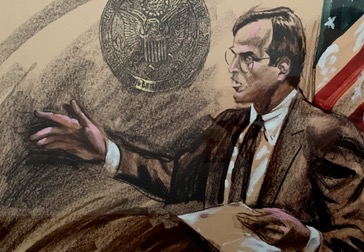Federal criminal justice reform is now law: What comes next?
U.S. Supreme Court Justice Louis Brandeis in the 1932 New State Ice Co. v. Liebmann decision stated that state governments “may, if its citizens choose, serve as a laboratory; and try novel social and economic experiments without risk to the rest of the country.”
Perhaps Justice Brandeis stated more than he knew at the moment in describing how change is effected in our democracy. Throughout our history, the broader federal government has traditionally moved very slowly to reform inefficient and ineffective policies, while the more nimble and less laborious states lead the way in identifying and correcting failed policies. There is not a more clear illustration of this principle than the national movement to reform the criminal justice system.
The justice reform movement recently celebrated its crowning achievement at the federal level as President Donald Trump signed the, Formerly Incarcerated Reenter Society Transformed Safely Transitioning Every Person (First Step) Act. The FIRST STEP Act is the culmination of a ten year bipartisan, bicameral push for reform and represents the most substantive federal justice reform in a generation.
Just as Justice Brandeis described, a national change was possible because states such as Texas, Georgia, and South Carolina led the way to enact effective reforms that made the public safer, saved taxpayer dollars, and reduced the revolving door of incarceration.
Since 2007, more than 30 states have passed reforms designed to prioritize prison beds for more serious offenders, reduce incarceration, reduce recidivism rates, and contain costs. States have achieved excellent results that federal reform hopes to emulate with the implementation of the FIRST STEP Act. For example, Texas saved its taxpayers over $2 billion while dropping its crime rate to its lowest level since 1968.
These results finally proved to members of Congress and the Trump administration that similar results were possible within the federal system. Now that the FIRST STEP Act is law, the question becomes what is next at the federal level and what policy innovations can state governments develop to continue the national momentum toward a more efficient and effective justice system.
The next order of business for implementation of federal reform is for the U.S. Senate to confirm William Barr as Attorney General of the United States. As Attorney General, Barr and his appointed lieutenants would be responsible for selecting a new director for the federal Bureau of Prisons and ensuring that the Bureau accurately administers the codified risk assessment system for low-level, non-violent offenders who are eligible for release, and provide these inmates with the programs to help them safely and successfully re-enter society upon their release.
While the sentencing reforms contained in the FIRST STEP Act were secondary to the prison reforms that are to be administered by the Department of Justice, further sentencing improvements are possible through the U.S. Sentencing Commission. The independent Sentencing Commission issues guidelines for sentencing in all federal criminal cases.
Today, the Commission lacks a quorum to function in its duties to administer federal sentencing laws. The acting chair, Judge William Pryor of the Eleventh Circuit U.S. Court of Appeals is currently awaiting renomination by the White House and confirmation by the Senate. By once again making Judge Pryor the chair of the commission, the Trump administration and the Senate can follow through on the promises made by the passage of the FIRST STEP Act.
These nominations are necessary to ensure proper implementation of the provisions contained in the FIRST STEP Act and are essential to ensure the reforms championed by President Trump and reform leaders in Congress are delivered. However, despite the “ah-hah” moment that the federal government realized with the passage of the FIRST STEP Act, states must continue to lead the way as they have done for the past decade.
Many states have joined the chorus of justice reform begun by Texas, Georgia and South Carolina. Ohio recently passed legislation to seal certain low-level criminal records and promote drug and alcohol treatment programs s alternatives to prison. In Pennsylvania, Governor Tom Wolf (D) signed the nation’s first “Clean Slate” law to seal records of offenders convicted of low-level, nonviolent misdemeanor offenses who do not incur further criminal charges over ten years.
Pennsylvania also removed one of the most challenging barriers for ex-offenders to safely and successfully re-enter society by eliminating automatic suspensions of driver’s licenses for low-level offenses. Kentucky Governor Matt Bevin and the state legislature enacted reforms to make it possible for former low-level inmates to attain occupational permits o they can work to support themselves and their families and turn away from crime.
The momentum achieved by state-level reforms made the FIRST STEP Act possible at the federal level. States that have been slow to move have example after example of successful improvements in other states. And now, in light of what President Trump and Congress have done to make the justice system more efficient and effective, it is vital to continue the cycle of reform across the country which has made our communities safer and restored lives at all levels.
Our entire nation can achieve greater public safety and justice outcomes through sensible sentencing reforms that reduce a large number of federal crimes and implementation of recidivism reduction programs such as mental health and substance abuse treatment, job and educational training programs, and the breaking down barriers to employment for those with a criminal record.
The federal government and the states can continue to work together to end the vicious cycle of incarceration and make it possible for ex-offenders to earn back the public’s trust by returning home as good spouses, parents, and neighbors.
By Tim Head, opinion contributor — 01/26/19 03:00 PM EST
Federal criminal justice reform is now law: What comes next?








